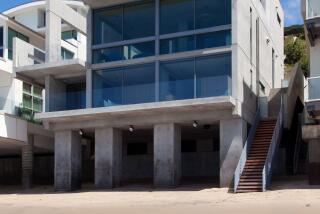County Quietly Settles 2 Excessive-Force Suits Against Deputies by Paying a Record $135,000
San Diego County has quietly agreed to pay $135,000 in the two largest individual settlements ever made in lawsuits charging excessive force by sheriff’s deputies.
The county paid $75,000 to Navy Petty Officer 1st Class David Tollerson for a shooting outside a Santee bar, and $60,000 to barber James Woodward for a beating inflicted at his Shear Madness hair shop in Solana Beach.
Both Tollerson and Woodward were charged with assaulting the deputies but were found not guilty in jury trials. They then sued the county and the deputies individually, claiming that they were treated brutally without provocation.
No Guilt Admitted
Without admitting guilt, the county counsel’s office, on behalf of the Board of Supervisors, agreed recently to settle the lawsuits but insisted that neither the plaintiffs nor their lawyers publicly disclose anything about the settlements or the already highly publicized incidents.
Chief Deputy County Counsel Daniel J. Wallace said the counsel’s office occasionally requests secrecy in court settlements to avoid further “torment” to county employees involved.
“It is a good way to spare everyone any further notoriety or publicity that might arise,” Wallace said. “It keeps the plaintiff’s attorneys from holding a press conference, writing a book or calling you (the reporter) and asking that you write another nice story about him.”
The three deputies named in the Tollerson and Woodward suits are still with the Sheriff’s Department. No internal affairs investigation was done in either case, a department spokeswoman said.
The Times was at first denied information about the settlements by County Counsel Lloyd Harmon and his staff. Deputy County Counsel Nathan C. Northup, who handled the Woodward case, would not confirm that a payment had been made or provide a reason for refusing to do so.
Documents detailing the settlements were released after The Times filed a formal request under the state Public Records Act.
Despite the records act, Wallace said, the county counsel’s office believes that judges retain authority to grant requests to seal records in public-agency cases. Sealing a settlement record is a common, although controversial, practice in cases involving solely private parties.
“A court is not bound by the act,” Wallace said. “A court can make an order sealing a record. It’s done all the time. It’s a very close question when it’s appropriate and when it’s not. There is no easy answer, but there is no legal prohibition.”
Still, Wallace said, the county counsel’s office will comply with any Public Record Act request filed.
According to documents released to The Times, the Woodward settlement was signed Dec. 16. The Tollerson settlement was signed by the plaintiff and his attorney March 31 and by Sheriff’s Sgt. Gordon Joseph Brooke and Chief Deputy County Counsel Wallace on April 21.
A San Diego jury last summer had awarded Woodward, who was a combat Marine in Vietnam, and his now ex-wife, Kelly, a total of $216,500 in damages and $27,717 in legal fees.
The trial court judge, however, overturned all but $2,000 of the judgment (that part awarded to Kelly Woodward) and ordered a new trial, saying he disbelieved Woodward’s testimony.
Beset with recurring psychological and physical problems, the 43-year-old Woodward opted for a settlement rather than continue the legal fight.
The county reached a settlement with Tollerson, 35, an aviation technician stationed at North Island Naval Air Station, without going to trial. Tollerson was shot by a vice-squad sergeant who mistook his squirt gun for a submachine gun.
In the settlement, Tollerson and his attorney promised to “not disclose, discuss, make any statement concerning, or otherwise publish the terms and conditions of this settlement” or the shooting itself.
Supervisors’ Chairman George Bailey said he does not condone secrecy but is not surprised or particularly upset with Harmon or his staff.
“Now that the party line has been set, I’m sure you’ll have no more problem from here on out,” Bailey said.
Bailey said he could not recall discussing the Woodward or Tollerson cases before the settlements were made, although Wallace said both cases were brought before the supervisors in closed session.
Unlike the San Diego City Council, the supervisors do not routinely list lawsuit settlements as part of the minutes from public meetings.
Noise Disturbance
Woodward and his former wife alleged that they were beaten by deputies Paul Roberts and Robert Takeshta on Nov. 6, 1981, in an incident that began when Woodward and a ballet instructor got into a verbal row over noise from the dance studio next door to Woodward’s hair shop.
Woodward alleged that he was choked and beaten with fists and a night stick before being arrested. Deputies claimed that Woodward had been groping for a pair of scissors to use as a weapon when they attempted to question him about the ballet instructor’s complaint that Woodward had threatened him.
In pictures taken the day after the incident, Woodward had extensive bruises on his neck, face and stomach. In 1982 a jury found him and his wife not guilty of assault charges.
In his civil suit, Woodward complained of sleeplessness, nightmares, headaches and sexual dysfunction because of the beating. A psychiatrist hired by the county testified that Woodward had a paranoid, antisocial, histrionic streak before the incident.
Shooting Outside Bar
In the incident outside a Santee bar, Tollerson was shot by Brooke in the stomach shortly before 1 a.m. on Sept. 13, 1986, after vice squad members mistook a toy squirt gun in Tollerson’s hand for a submachine gun.
Tried and acquitted on charges of attempted murder and assault on a police officer, Tollerson later filed suit against the county and Brooke for unspecified damages.
Brooke and other vice-squad officers, all in street clothes, acknowledged that they had been drinking at Brannen’s Place, a blue-collar bar popular with Navy employees and construction workers.
Tollerson underwent a six-hour operation and spent six days in the hospital.
In a court document, Tollerson’s attorney, Nelson Brav, listed the potential damages due to Tollerson at $234,886, which included medical expenses, lost wages and legal fees.
Brav, in an interview, said he thought $75,000 was a reasonable settlement given the chance of losing the case if it went to a jury or seeing an award whittled down by a finding that Tollerson contributed to his own misfortune.
“Those are the things both sides have to consider before deciding whether to settle or go to trial,” Brav said.
In both settlements, the county agreed to pay the awards from the treasury, rather than force the deputies to pay.
County policy calls for the county to pay all general damages assessed against its employees for any actions considered “in the course and scope of their employment.”
But, by exercising secrecy in these matters, employees don’t know how the county stands on its right to hold employees responsible for punitive awards.
A change two years ago in state law gave public employers greater latitude in making employees responsible for any punitive damages assessed against them. The Tollerson and Woodward cases were purely general damages, with no punitive damages, according to the county counsel’s office.
The question of whether the county will pay punitive damages for its employees has engendered considerable anxiety among sheriff’s deputies.
Deputy Takeshta’s wife, Karol, said she and her husband worried continually during the Woodward trial that they would be personally liable for any punitive damages.
More to Read
Sign up for Essential California
The most important California stories and recommendations in your inbox every morning.
You may occasionally receive promotional content from the Los Angeles Times.










